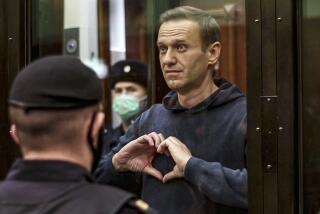Q&A: Taking on Russian corruption
Moscow lawyer and blogger Alexei Navalny has been singlehandedly taking on Russia’s state-controlled energy giants, accusing them of large-scale embezzlement and corruption.
After five years, the whistleblower’s efforts have borne fruit. The Russian Investigation Committee, the country’s chief investigation organization, has launched a criminal fraud case — against Navalny. He is accused of giving bad advice to a timber concern.
In an interview, Navalny spoke about his campaign and the government’s action against him.
What’s your advice for those thinking about investing in Russia?
On the whole, investments in Russia may be profitable, and I am in no case warning against investing in Russia. But the gains for investors could be significantly higher if Russian companies were at least abiding by the basic rules of corporate management employed in the West. Investing in Gazprom [the state natural gas monopoly] could yield profits too. But if we made some basic steps aimed at curbing corruption within Gazprom, the company’s worth would rise by about 30%.
In practice, investors have no possibility to influence major Russian companies’ performance and receive information about it. My associates and I have spent three hard years constantly trying to get the basic documents about the performance of big companies such as [oil firms] Rosneft and Transneft. Finally we got a court order that the most basic documents be opened to us. But as a rule, the information about the work of such companies still remains a closely guarded secret.
When did you start to work to expose corruption?
It all started about five years ago as I realized that I needed to do something to safeguard my personal investments. The most interesting investment venues in Russia are oil- and gas-sector companies. These are a bunch of so-called major companies in Russia. Some of them are formally private, but they are all under state control. When I started to invest in those companies, I quickly saw that the dividends were very small while their management were leading luxury lives in their lavish villas in France, Spain and so on.
Last November you made a report to the U.S. Helsinki Commission about corruption in Russia. What were your recommendations and what was the reaction?
I said that U.S. authorities don’t need to resolve Russian problems but they need to protect their countrymen from corruption spreading from Russia, because when corrupt businessmen and officials embezzle money in Russia, they invest it in the West, including the United States, where it is a federal crime called money-laundering.
At the same time, investment funds invest billions of dollars into Russian companies, and if within the framework of their corporate social responsibility they took up measures to compel Russian companies to observe elementary business ethics, that could be a tremendous contribution to fighting corruption in Russia, I said. It is one thing when the struggle against corruption in Gazprom is a demand set by myself, and it is quite different when this is the demand of Black Rock or U.S. pension funds, mutual funds and all the rest.
So my message … was this: Protect yourselves and thus you will help us. On the whole my position was met with understanding, but so far there has been little practical progress.
How seriously has corruption infiltrated the power hierarchy of Russia?
Russian power structures are corrupt inside out. People who don’t become part of corrupt schemes cannot efficiently work within the Russian government.
President Dmitry Medvedev proclaimed the struggle against corruption as one of the key parts of his ambitious modernization program. His most recent step to transform the punishment for bribe-taking into six- or seven-digit fines is viewed as a measure to bring a new impetus to this fight. What is your take on these efforts?
I don’t hear anything new and anything more from the Kremlin except the constant lamenting about corruption and mumbo-jumbo advice on how to prevent it. None of Medvedev’s declared intentions have ever materialized. During his entire reign as president there has been no serious corruption case in Russia that ended in a courtroom. Our president can suggest as many measures as he chooses, but in the situation when the police, the prosecutors and the security services are all involved in covering up for corruption scams, there will be no one to fine because culprits don’t end up under investigation.
What are your thoughts on a fraud case opened against you by the Russian Investigation Committee?
It is a purely political and completely falsified case initiated at the very top. None of the cases I initiated have ever reached that level of attention. The Kremlin [leaders are] very irritated by the fact that they cannot control my blog in any way, [so they are responding,] be it scare tactics, a system of licensing or blunt money. I know they can do anything to me if they want.
It is the risk that comes with my job. But I am ready to take that risk. We have already received anonymous telephone calls with threats unless we drop our investigations. They have been digging dirt on me all this time and have come up with such a flimsy case in which they are not even accusing me of embezzling the money but just fraudulently causing some damage to an obscure provincial company. They want to scare me. For them the best outcome would be if I emigrate. But I will not give them that pleasure. I choose to stay and face the risks.
People who fight corruption in Russia take great risks. I am prepared to take these risks to make life in our country better. I will continue to do my work against all odds.
https://navalny.livejournal.com/
More to Read
Start your day right
Sign up for Essential California for news, features and recommendations from the L.A. Times and beyond in your inbox six days a week.
You may occasionally receive promotional content from the Los Angeles Times.






